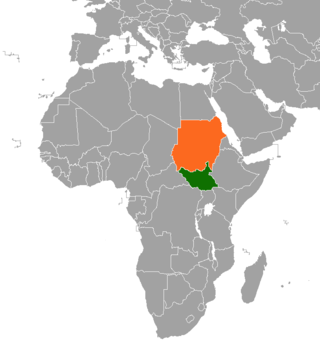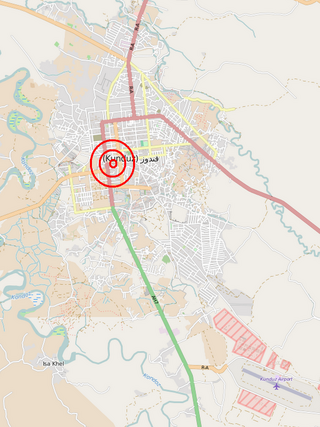Related Research Articles

Médecins Sans Frontières, also known as Doctors Without Borders, is a charity that provides humanitarian medical care. It is a non-governmental organisation (NGO) of French origin known for its projects in conflict zones and in countries affected by endemic diseases. The organisation provides care for diabetes, drug-resistant infections, HIV/AIDS, hepatitis C, tropical and neglected diseases, tuberculosis, vaccines and COVID-19. In 2019, the charity was active in 70 countries with over 35,000 personnel; mostly local doctors, nurses and other medical professionals, logistical experts, water and sanitation engineers, and administrators. Private donors provide about 90% of the organisation's funding, while corporate donations provide the rest, giving MSF an annual budget of approximately US$1.63 billion.
Humanitarian aid workers belonging to United Nations organisations, PVOs / NGOs or the Red Cross / Red Crescent are among the list of protected persons under international humanitarian law that grant them immunity from attack by belligerent parties. However, attacks on humanitarian workers have occasionally occurred, and become more frequent since the 1990s and 2000s. In 2017, the Aid Worker Security Database (AWSD) documented 139 humanitarian workers killed in intentional attacks out of the estimated global population of 569,700 workers. In every year since 2013, more than 100 humanitarian workers were killed. This is attributed to a number of factors, including the increasing number of humanitarian workers deployed, the increasingly unstable environments in which they work, and the erosion of the perception of neutrality and independence. In 2012 road travel was seen to be the most dangerous context, with kidnappings of aid workers quadrupling in the last decade, reaching more aid workers victims than any other form of attack.

James Jude Orbinski is a Canadian physician, humanitarian activist, author, and scholar in global health. Dr. Orbinski began his role as principal of Massey College at the University of Toronto in the 2024-2025 academic year, where he is also Full Professor in the Department of Family and Community Medicine in the Temerty Faculty of Medicine, and is cross-appointed to the Munk School of Global Affairs and Public Policy, as well as the Dalla Lana School of Public Health,. Previously a professor in the Faculty of Health Science at York University, Dr. Orbinski founded the Dahdaleh Institute of Global Health Research.

Malakal is a city in South Sudan, serving as the capital of Upper Nile State in the Greater Upper Nile region of South Sudan, along the White Nile River. It also serves as the headquarter of Malakal County and it used to be the headquarter of Upper Nile Region from the 1970s to the late 1990s.

Chorley and South Ribble Hospital is an acute general hospital in Chorley. The hospital is situated on Euxton lane in Chorley close to junction 8 of the M61. It is managed by Lancashire Teaching Hospitals NHS Foundation Trust.

Bentiu, also spelled Bantiu, is a city in South Sudan. It is the capital of Unity State.

Sudanese nomadic conflicts are non-state conflicts between rival nomadic tribes taking place in the territory of Sudan and, since 2011, South Sudan. Conflict between nomadic tribes in Sudan is common, with fights breaking out over scarce resources, including grazing land, cattle and drinking water. Some of the tribes involved in these clashes have been the Messiria, Maalia, Rizeigat and Bani Hussein Arabic tribes inhabiting Darfur and West Kordofan, and the Dinka, Nuer and Murle African ethnic groups inhabiting South Sudan. Conflicts have been fueled by other major wars taking place in the same regions, in particular the Second Sudanese Civil War, the War in Darfur and the Sudanese conflict in South Kordofan and Blue Nile.
Ethnic violence in South Sudan has a long history among South Sudan's varied ethnic groups. South Sudan has 64 tribes with the largest being the Dinka, who constitute about 35% of the population and predominate in government. The second largest are the Nuers. Conflict is often aggravated among nomadic groups over the issue of cattle and grazing land and is part of the wider Sudanese nomadic conflicts.
Medical neutrality refers to a principle of noninterference with medical services in times of armed conflict and civil unrest: physicians must be allowed to care for the sick and wounded, and soldiers must receive care regardless of their political affiliations; all parties must refrain from attacking and misusing medical facilities, transport, and personnel. Concepts comprising the principles of medical neutrality derive from international human rights law, medical ethics and humanitarian law. Medical neutrality may be thought of as a kind of social contract that obligates societies to protect medical personnel in both times of war and peace, and obligates medical personnel to treat all individuals regardless of religion, race, ethnicity, or political affiliation. Violations of medical neutrality constitute crimes outlined in the Geneva Conventions.

Joanne Liu is a Canadian pediatric emergency medicine physician, Associate Professor of Medicine at the University of Montreal, Professor of Clinical Medicine at McGill University, and the previous International President of Médecins Sans Frontières/Doctors Without Borders (MSF). She was elected president during MSF's International General Assembly in June 2013.

The South Sudanese Civil War was a multi-sided civil war in South Sudan fought from 2013 to 2020, between forces of the government and opposition forces. The Civil War caused rampant human rights abuses, including forced displacement, ethnic massacres, and killings of journalists by various parties. Since its end South Sudan has been governed by a coalition formed by leaders of the former warring factions, Salva Kiir Mayardit and Riek Machar. In 2024, the country continues to recover from the war while experiencing ongoing and systemic ethnic violence.
Al-Awda Hospital is a hospital in the Gaza Strip, Palestine. The hospital provides basic medical care, with an emergency room and obstetric services for women in the northern Gaza Strip.

On 3 October 2015, a United States Air Force AC-130U gunship attacked the Kunduz Trauma Centre operated by Médecins Sans Frontières in the city of Kunduz, in the province of the same name in northern Afghanistan. 42 people were killed and over 30 were injured. Médecins Sans Frontières condemned the incident, calling it a deliberate breach of international humanitarian law and a war crime. It further stated that all warring parties had been notified about the hospital and its operations well in advance.
A Saudi Arabian-led military intervention in Yemen began in 2015, in an attempt to influence the outcome of the Yemeni Civil War. Saudi Arabia, spearheading a coalition of nine Arab states, began carrying out airstrikes in neighbouring Yemen and imposing an aerial and naval blockade on 26 March 2015, heralding a military intervention code-named Operation Decisive Storm. More than 130 health facilities(2019) in Yemen have been destroyed by a series of airstrikes conducted by the Saudi Arabian-led coalition since March 2015. Many of these have been public health hospitals staffed or supported by Doctors Without Borders (MSF). Critics of the assaults say the airstrikes are war crimes in violation of the protections of health care facilities afforded by the internationally recognized rules of war and have called for independent investigations.
The Aleppo bombings were intense bombardments on both rebel and government-held areas in the city of Aleppo, Syria starting in late April 2016. Some rebel shelling also hit a Kurdish-held part of the city. The bombings decreased in intensity after 55 days when a temporary truce was established. However, the bombings continued through July.
Christos Christou is a Greek physician who is the international president of Médecins Sans Frontières/Doctors Without Borders (MSF).
Bentiu Civil Hospital, often known as Bentiu Hospital and sometimes Bentiu State Hospital or Bentiu District Hospital is a government hospital in Bentiu, Unity State, South Sudan.
The humanitarian crisis following the 2023 Sudan conflict was further exacerbated by the violence occurring during a period of high temperatures, drought and the conflict starting during the latter part of the fasting month of Ramadan. Most residents were unable to venture outside of their homes to obtain food and supplies for fear of getting caught in the crossfire. A doctors' group said that hospitals remained understaffed and were running low on supplies as wounded people streamed in. The World Health Organization recorded around 26 attacks on healthcare facilities, some of which resulted in casualties among medical workers and civilians. The Sudanese Doctors' Union said more than two-thirds of hospitals in conflict areas were out of service with 32 forcibly evacuated by soldiers or caught in the crossfire. The United Nations reported that shortages of basic goods, such as food, water, medicines and fuel have become "extremely acute". The delivery of badly-needed remittances from overseas migrant workers was also halted after Western Union announced it was closing all operations in Sudan until further notice.
Beginning on April 21, 2022, clashes broke out between Janjaweed and Masalit civilians in the Kreinik refugee camp near El Geneina, West Darfur. These led to massacres over the following days by Janjaweed and the Rapid Support Forces, with hundreds of civilians killed.
References
- 1 2 Lynch, Justin. "Hospitals targeted across South Sudan". www.aljazeera.com. Archived from the original on 2022-07-06. Retrieved 2023-04-24.
- ↑ Kuyok Abol Kuyok. (2015). South Sudan: The Notable Firsts. United Kingdom: AuthorHouse UK.
- ↑ "Top UN official describes "shocking" Malakal aftermath". Sudan Tribune . 2014-02-28. Retrieved 2023-04-24.
- ↑ "South Sudan: MSF hands over adult inpatient services of Malakal Teaching Hospital to the Ministry of Health". MSF Eastern Africa. 2019-09-24. Archived from the original on 2023-04-24. Retrieved 2023-04-24.
- ↑ Hobbs, P. H. H., Chernotsky, P. H. I. (2017). Crossing Borders: International Studies for the 21st Century. United States: SAGE Publications.
- 1 2 "Malakal Teaching Hospital in a sorry state - Juba Echo". 2022-03-11. Archived from the original on 2023-01-27. Retrieved 2023-04-24.
- ↑ "Doctors at Malakal hospital decry poor working conditions". Radio Tamazuj. Archived from the original on 2021-01-06. Retrieved 2023-04-24.